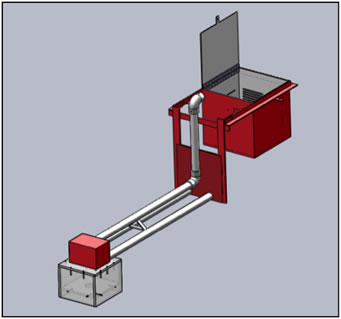Project Designation: Ultrasonic Floodgate Sensor
PROJECT PARTNERS:
THE MINISTRY OF PLANNING AND DEVELOPMENT, TRINIDAD AND TOBAGO
Flooding is a chronic problem in some parts of Trinidad and Tobago, which has been exacerbated in recent years by development of mountain slopes leading to faster run-off times. Infrastructural developments and flood control systems have failed to keep pace with the increased run-off. A compounding factor is poor garbage disposal techniques, leading to the clogging of drains.
This project proposes, designs and develops a non-contact sensor device for use at a flood control station in the East Port of Spain area. The device senses the level of drain water in the sump and activates a 17,000 gph pump to rapidly drain the sump, once it rises above a critical level. This approach circumvents the issues associated with debris and other contamination in the drain water, which commonly lead to sensor malfunctioning and system failure in other approaches.

|
Project Title: Statistical Moments associated with Large Ocean Waves
PROJECT PARTNERS:
BPTT
Random large ocean waves, potentially destructive to freight vessels, offshore oil platforms, offshore wind farms and other ocean-based structures are more prevalent than traditional statistical distributions predict. They have been associated with physical phenomena such as non-linear energy transfer between waves, but the scientific community has not completely analytically captured the mechanisms behind large wave occurrence. It is, therefore, difficult to account for them in the design and specification of ocean-going equipment.
A cutting-edge mathematical model has been developed that can give a more precise quantification of the likelihood of uncharacteristically large waves. Current research in the Department of Mechanical and Manufacturing Engineering aims at developing the existing model by means of a thorough validation exercise using data provided by BPTT. It will test the hypothesis that nonlinearity of the deep water wave equations is a major contributor to non-Gaussianity in ocean wave statistics. A validated model will provide the foundation for the development of a comprehensive prediction tool for safe seafaring and naval engineering, which will improve on traditional linear models for surface wave statistics. The subsequent development of this tool will be the focus of this collaborative project between MMERC and BPTT.

|
Project Title: Methanol-Biofuel Diesel Substitution
PROJECT PARTNERS:
CARILEC, MASSY CAT AND METHANEX
The need for alternative energy arrangements is an issue that is being addressed by many countries worldwide. Climate change, decreasing fossil fuel resources and increasing global energy consumption are but some of the factors driving this phenomenon. The Caribbean region is not exempt. As a region that is marked by fragile economies and over 90% dependence on fossil fuels, the recent increases in the prices of crude oil has emphasized the fragility of the current arrangement. Many countries are unable to cope with these higher prices and are now in search of alternatives.
The use of methanol and vegetable oil fuel blends has previously been proven in laboratory tests to be a feasible fuel for compression-ignition reciprocating engines and has also been shown to have potential economic benefits for regional markets. This project seeks to determine the technical and logistical requirements for a full scale implementation of the fuel blend, at an active power generation plant in the region. This will be determined via a more in-depth and long term technical study of the fuel blends in a pilot plant context. Critical to this study will be the establishment of a pilot plant facility at the UWI St. Augustine Campus.

|